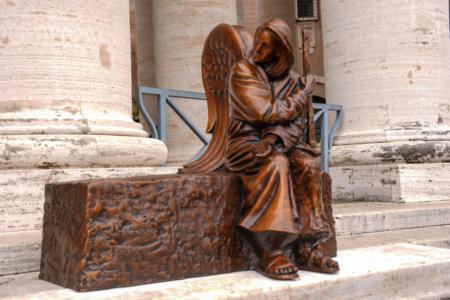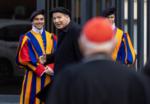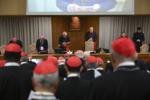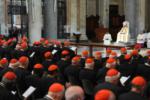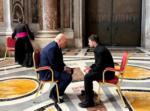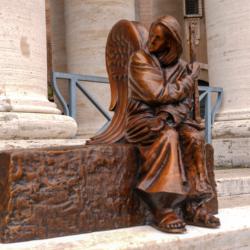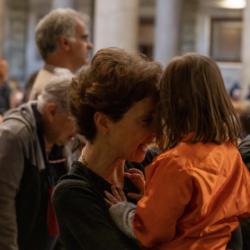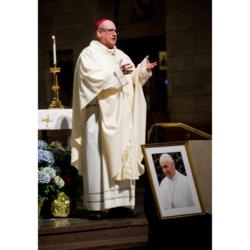Spiritual reading in the New Year
If you don't have the habit already, consider a New Year's resolution to do some spiritual reading every day, about fifteen minutes, preferably in the quiet of the morning, before the day's activities begin. It is best to keep this morning reading short, so that you can do it consistently. "Don't neglect your spiritual reading," St. Josemaria Escriva wrote, "Reading has made many saints." He was probably one of them. Blessed John Paul II was surely another.
If such a plan seems good to you, I offer some suggestions of books, deliberately picking some that are perhaps less well known but extremely valuable.
1. The Bible. All spiritual reading should be based on a study of Sacred Scripture. I recommend the Jerusalem Bible for its accuracy and fluency, but get an older version, published before 1985, not marred yet by distortions of political correctness. Another good choice is the Navarre Bible, published in many volumes, which contains the excellent Catholic Revised Standard translation along with facing Vulgate, reliable scholarly notes, and an edifying commentary drawing from the writings of saints.
2. However, if you really wish to read the Bible in the light of the tradition of the Church, then no better source can be recommended than the "Catena Aurea," compiled by St. Thomas Aquinas. Have you ever read a work by a Church Father, such as St. Augustine or St. John Chrysostom, and noticed the frequent references to Scripture? Well, St. Thomas took all such references from all of the works of the Fathers he was acquainted with, collated them, and wove them together into a single continuous commentary, on each of the four gospels. His contemporaries called it a "chain" because it links together disparate remarks, and "golden" because of the genius and skill with which this is done. It is hard to get volumes of the "Catena." But go to the site dhspriory.org to download a public domain translation of this work or other works of St. Thomas.
3. "Brother Petroc's Return". Here in contrast is a short and light modern classic, a fable about a Benedictine monk in the 16th century who seems to die at an early age on the eve of his ordination, but who actually remains miraculously alive in a kind of sleep ("suspended animation"?), to revive in the 20th century. Written by a self-effacing Dominican nun in England, who identified herself simply as "S.M.C." ("Sister Mary Catherine"), the book was an international bestseller when first published in 1937. Brother Petroc is of course a creature of the Renaissance and Middle Ages. What have we lost since then? What was the character, taken for granted, of even a simple religious brother like? Petroc lives outside himself; he is introspective, yet without being self-absorbed. In a memorable scene, by accident he encounters a modern book on spirituality, marked by a certain emotionalism and "enthusiasm," and he "refutes" its teaching by applying the syllogistic he learned as a basic tool of thought, cutting it to shreds logically -- but in an unassuming manner, as if "what else could one be but logical?".
4. The "Breviloquium" by St. Bonaventure. Speaking of the Middle Ages, perhaps you have wished to read one of the great synthetic works from that period. In seminary, I understand, it used to be recommended to parish priests as a matter of course that to keep "sharp" on doctrine they read one article from the "Summa Theologica" each day. I have a friend, a layperson, who actually did this with some consistency and recently celebrated completing the entire "Summa" -- 20 years after he started! We are guaranteed the gift of perseverance if we pray for it, indeed, but not every sort of perseverance. Many of us do not even have any reasonable expectation of lasting 20 years, under God's grace. So, for the weak, the circumscribed, and those who live more for the week and the month than the decade, I propose an alternative plan. St. Bonaventure was a great systematist, like St. Thomas his contemporary, and wrote his own sprawling theological synthesis. But this master of drawing distinctions and putting things in order also did us the favor of reducing all of theology, as he understood it, to a single short and clear volume, the "Breviloquium" (which means "brief statement"). It has about 70 concise chapters; at the pace of one a day, you could finish before winter was out.
5. To jump from the Middle Ages to a recently published book, I recommend "Love and Responsibility" by Karol Wojtyla. "Recently published?" -- you say -- "Hasn't that book been out for decades?" Yes it has, but, alas, in an inferior translation. Last year the Daughter's of St. Paul (Pauline Press) brought out a fresh and new translation by Grzezgorz Ingatik, a native Polish speaker, who was educated in the United States and studied the philosophy and theology necessary for deeply grasping the text. The goal of his translation, he says, is "to allow the English reader to enter into the thought of Wojtyla in a more profound way so as to encounter the reality ... of the human person in the order of love" accomplished "by meticulous attention to the original Polish text." I cannot vouch for the latter, as I do not know Polish, but the clarity, vibrancy and greater philosophical astuteness of this new text are impressive.
Michael Pakaluk, a member of the Pontifical Academy of St. Thomas, is chairman and professor of philosophy at Ave Maria University.
